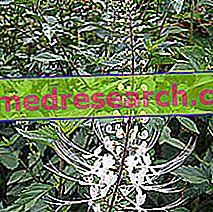
Scientific name
Orthosiphon stamineus
Family
Labiatae
Origin
Indonesia
Synonyms
Java tea
Used Parts
Drug consisting of leaves
Chemical constituents
- Essential oil (sesquiterpenes);
- saponins;
- Vitamins;
- Flavonoids;
- Mineral salts (potassium salts in particular)
Orthosiphon in Herbalist: Property of Orthosiphon
The orthosiphon boasts excellent diuretic properties, since it facilitates the elimination of sodium chloride and with it the water retention. Because of these characteristics, the orthosiphon preparations are indicated in the forms of arterial hypertension, in heart failure, and in all cases of water retention, for which the doctor considers it appropriate to intervene with substances having diuretic activity.
Biological activity
As mentioned, orthosiphon is a plant with interesting diuretic properties, mainly given by the flavonoids it contains.
The essential oil of ortosiphon - thanks to its sesquiterpenes content - has instead shown to possess antibacterial and antiphlogistic properties.
Ortosiphon against kidney stones and urinary tract infections
Thanks to the diuretic action that the orthosiphon is able to exercise, its use has obtained official approval for the treatment of urinary infections and kidney stones.
In truth, to be more precise, the plant is used to promote diuresis, in such a way as to be able to exploit the washing power of the urine, thus favoring a faster resolution of infections that affect the urinary tract and preventing the formation of kidney stones.
Of course, to treat and prevent the aforementioned disorders, the orthosiphon must be used internally.
If the orthosiphon is taken in the form of a liquid extract (ratio drug / extract 1: 1, using water as an extraction solvent), generally, we recommend taking about two grams of product once or twice a day.
It is good to remember that to favor the diuretic effect, it is essential to take orthosiphon with abundant quantities of liquids.
However, for more information about the uses of orthosiphon in the treatment of kidney stones and urinary infections, see the article on "Treating yourself with Ortosiphon".
Ortosiphon in folk medicine and in homeopathy
In popular medicine - in addition to being used as a diuretic remedy useful for combating urinary tract infections and kidney stones - orthosiphon is also used in the treatment of rheumatism, gout, hematuria and albuminuria.
The orthosiphon is also exploited by homeopathic medicine, where it can be found in the form of granules, mother tinctures and oral drops.
In this context the plant is used in case of nephrolithiasis, renal colic, gallstones, cellulite, overweight and obesity.
The amount of homeopathic remedy to be taken can vary from one individual to another, also depending on the type of disorder that needs to be treated and according to the type of homeopathic preparation and dilution that you want to use.
Contraindications
Avoid taking ortosiphon and its preparations in case of hypersensitivity to one or more components and in patients who have edema caused by renal and / or cardiac failure.
Pharmacological Interactions
- effect summations with the simultaneous intake of diuretic and hypotensive drugs.



